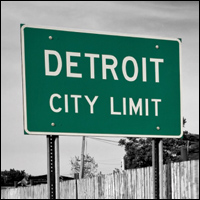Last week’s incident of Detroit, which is known as Motor City of USA, seeking bankruptcy protection has turned the focus on Indian municipal corporations and the bonds issued by them. Hurried conclusion one could arrive at is that in India municipal bonds (or Muni Bonds as popularly known as) form an insignificant portion of the debt market and chances of Municipal corporations going burst is next to impossible due to state backing.
In India Muni bonds have hardly caught the fancy of the investors – partly because municipal corporations have not yet inculcated the habit of raising money by issuing bonds and partly because investors’ concerns about transparency in the operations of municipal corporations which are often considered to be epitome of corruption and breeding ground of inefficiency.
|
Guidelines for issuing tax free bonds
|
|
Municipal corporations are allowed to issue tax free bonds subject to fulfilment of certain conditions. Funds raised through such bonds can be used only for capital investments in urban infrastructure like potable water supply, sewerage or sanitation projects, drainage projects, solid waste management projects, construction of roads, bridges and flyovers and urban transport projects. Before the actual Issuance of Tax Free Bonds municipal corporation should complete the investment plan for the project, should clearly define project milestones, final tender documents should have been issued to all pre qualified bidders and land required for the project should be in possession of the issuer. Other conditions are:
|
Most of the municipal corporations depend upon grants from state governments and other sources for financing projects. Growing real estate activities in cities (both metro as well as non-metro cities) has increased non tax revenues of municipal corporations considerably. Functions of these civic bodies include water supply,sewerage treatment, storm water drainage management, solid waste management, and road networks maintenance. Ability to levy taxes in case of some Municipal corporations has made them less dependent on state government for their survival and functioning. For example, Octroi collections account for 38% of the total revenue income of Mumbai Municipal Corporation as a result of which it has become financially independent and need not look for state government for support.
|
Major projects undertaken by Municipal Corporations
|
|||
|
Project
|
Local Body
|
Cost in `
|
Status
|
| Coastal Road Project | Mumbai Municipal Corp |
8,000
|
Tender issued to appoint consultant for preparing DPR |
| Metro Rail Project | Pune Municipal Corp |
8,000
|
Work may start this year and requires five years for completion |
| Outer Ring Road | Surat Municipal Corp |
5,000
|
Land is being acquired. Process of getting clearances is on |
| Cooum restoration and management project | Chennai Municipal Corp |
3,000
|
Last month technical consultant was appointed for the project |
| Solid waste management project | Hyderabad Municipal Corp. |
800
|
Though project was approved in 2010 latest updates are not available |
| BRTS Corridor project | Pimpri Chinchwad Municipal Corp |
656
|
The project is under execution |
Most of the expenditure of municipal corporations is concentrated on garbage collections water supply etc. But charges collected for such charges are not incommensurate with the cost involved or the quality of service. They do not form major portion of the revenue of the corporations though major portion of their resources are deployed to provide these services. Major reform exercise need to be undertaken to link these services to their cost.
|
|||||||||||||||||||||||||||||||
JNNURM has tried to bring about some amount of reforms in the functioning of municipal corporations by using carrot and stick method, but it hasn’t been able to achieve much success in this regard so far. While some progress has been made in implementation of reforms as committed under JNNURM, there have been many slippages in introducing these measures. In fact, there are hardly any projects which have met their time deadline. At the same time it should be noted that JNNURM might not have been able to bring in major reforms in the functioning of most of the municipal corporations in the country but at the same time the programme has helped some of the corporations to expand their horizon of project execution. Today many municipal corporations no longer confine themselves to traditional water and solid waste management projects but are taking up some ambitious projects too.
Municipal corporations may not meet the same fate as Detroit did but it is high time that we take serious note of the working of municipal corporations in India. Importantly, Detroit incident might have made it difficult (at least in the near future) for those Municipal corporations that are aspiring to raise funds through Muni bonds issues. Further, even after more than two decades since India embarked upon structural reforms, we have hardly seen any major reforms measures percolating down to the level of local bodies. For example, Ahmedabad Municipal Corporation which has A+ rating by Crisil, is yet to implement some key reforms such as GIS implementation and double entry system of accounting. Most of the municipal corporations today suffer from weak financial risk profile, inadequate service arrangements, slow pace of reforms, and weak project implementation capacity. Therefore, next generation reform measures should concentrate on improving and bringing about transparency in the functioning of local bodies which is an uphill task indeed.











